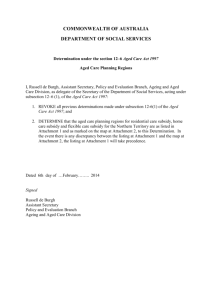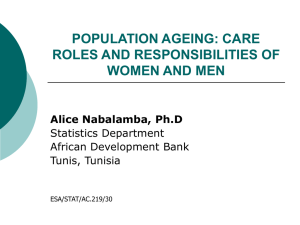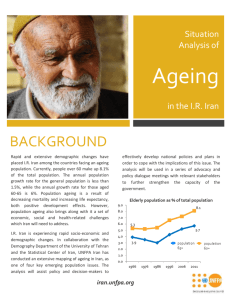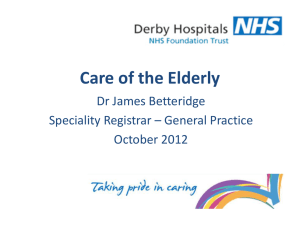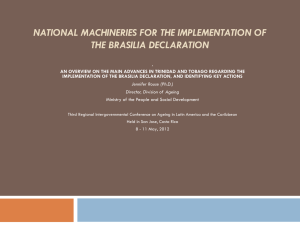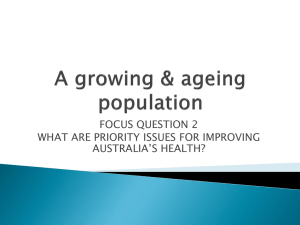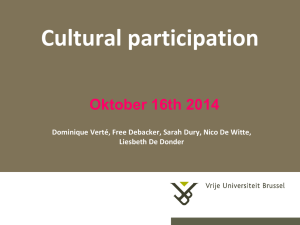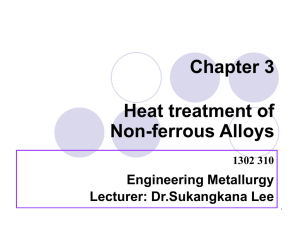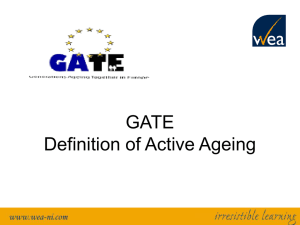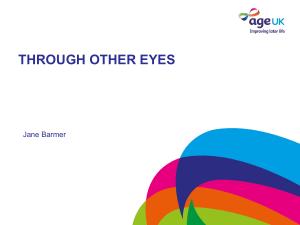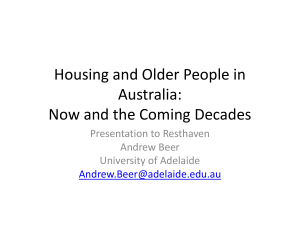SOUTH-ASIA-FORUM_ppt - International Federation on Ageing
advertisement
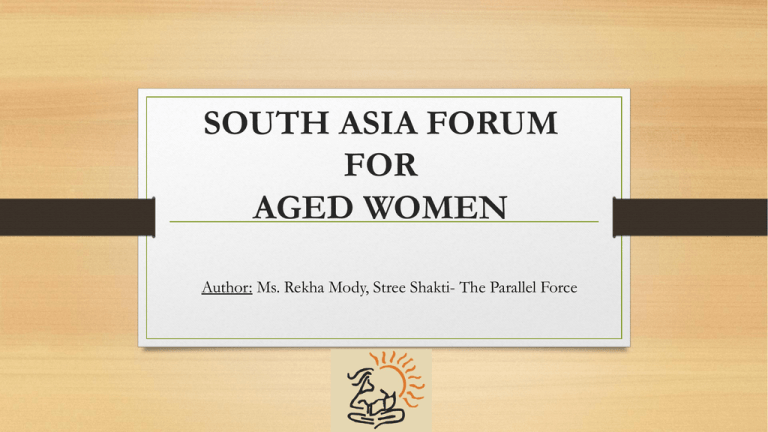
SOUTH ASIA FORUM FOR AGED WOMEN Author: Ms. Rekha Mody, Stree Shakti- The Parallel Force Issue of Women Ageing Feminization of ageing has now become a worldwide phenomenon. Demographic projections show that the elderly females will far outnumber their male counterparts in the next few decades. Globally, women form the majority of older persons. Today, for every 100 women aged 60 or over, worldwide, there are 84 men. For every 100 women aged 80 or over, there are only 61 men. Added to this, higher incidence of widowhood, illiteracy, malnutrition, and high economic dependency accentuate the vulnerability of elderly females. It is observed that elderly women are proportionally as well as socio-culturally more vulnerable to destitution in comparison to their male counterparts. Hence, while responding to ageing becomes a necessity, the issues and concerns of elderly women need special attention and inclusion in policy, programs and access to better quality of life. The Madrid Declaration MIPAA Madrid International Plan of Action on Ageing 2002 reaffirmed the commitment of the member states to the promotion and protection of human rights, and called for elimination of age discrimination, neglect, abuse and violence. It contains guidance: right to work right to health participation and equality of opportunity throughout life International Conference on “Ageing Women: Critical Challenges and Concerns” To mainstream the issues of ageing women and create awareness for their issues and concerns, Stree Shakti-The Parallel Force- held an International Conference on “Ageing Women: Critical Challenges and Concerns” on 26th and 27th August, 2013 at India International Centre, New Delhi. The conference was supported by HelpAge India and UNDP. The Conference brought together delegates and age care specialists from Bangladesh, Afghanistan, Nepal and India. The conference was led by an eminent panel of speakersDr. Syeda Hameed, Ms. Lise Grande, Dr. Mohini Giri, Kumari Selja, Mathew Cherian, Dr. Massouda Jalal, Shegufta Sharmin, Sangita Nirola, Dr. Moneer Alam, Fedrous Ara Begum, Lily Thapa, Smt. Salma Ansari, Rashmi Singh and Dr. Ranjana Kumari. Resolution from the Conference Gender Responsive Policies, Programmes and Practices To revise Senior Citizen policies and programmes and make it more rights based Have desegregated data on ageing population Ask for UN Convention on Ageing Population Elder Abuse Sensitize business houses to promote Ageing Friendly employment opportunities, Promote Day Care concept for elderly people to avoid long durations of isolation and engagement with care Submit recommendations to concerned governments and international bodies to address the issues of witchcraft. Resolution from the Conference Empowerment: Health and Well being Affirmative action, policy and programs for aged women’s empowerment as they are most vulnerable to discrimination, violence, poverty and crisis Governments to ensure older women’s access housing, health, security and empowerment on equal terms with men Governments to allocate adequate budget for ageing population Caregiving &Elderly Care A percentage of the 2% of the CSR of industries/ corporates earmarked under the New Companies Act must be allotted for senior citizen’s programmes/projects. Sensitization of school children to be a nation wide programme in which senior citizens act as ‘teachers’ to inculcate moral views amongst the youngsters THE SOUTH ASIA FORUM FOR AGED WOMEN INDIA CHAPTER A key outcome of the conference was the formation of the South Asia Forum for Aged Women (SAFAW) to combine the efforts of different countries, organizations and individuals for a more sustained impact on society and policy. Stree Shakti- The Parallel Force is spearheading the work on aged women in India between November 2013 to July 2014 supported by UNFPA. South Asia Forum for Aged Women aims To identify innovations of services provided or policy implementation to To undertake policy advocacy and bring issues and concerns of the aged women elderly women and documenting them as best practices on the agenda of the government agencies and departments help To mainstream the issues and concerns of the aged women on the agenda of women’s groups and other relevant agencies To mainstream the issues of aged women on the agenda of the CSR and Corporate Foundations and motivate them to make resource cause commitment for the Why document good practices? One of the key outcome of the International Conference on “Ageing Women: Critical Challenges and Concerns” on 26th and 27th August, 2013 was to take up the cause of older women and develop country wise understanding of status of older women Dearth of information and material regarding the good work done by various governmental and non govt. programs across the country Advocate for innovative interventions and programs to support the cause of elderly women Wider public awareness and increased sensitivity towards the challenges and problems faced by aged women in India and neighboring SAARC countries specifically amongst women’s and human rights groups, corporate foundations, government departments etc. Criteria for documenting a good practice Scale- The project should have been implemented with a wider beneficiaries group that provides enough evidence for it to be a good practice Effectiveness- Ability to bring about some visible or measurable change in the life of aged women Innovative- the practice should have the Capacity to demonstrate an innovative approach Sustainability- The degree of sustainability of good practice is very much important Replicability- the project should have the potential to be duplicated in other regions Studies selected so far ILC-1 project of Ajibai Sathii Batwa, senior citizen volunteers Athashree retired homes, Pune Case study of SEWA Mahila Sahkari Bank, Ahmedabad Case study of Ekkal Nari Sansthan, Udaipur Healthcare services provided by the Calcutta Metropolitan Institute of Gerontology, Kolkata Widows of Vrindaban, a study of elderly women in Ashrams Farmers Widows of Vidarbha, A HelpAge India initiative Thank You
